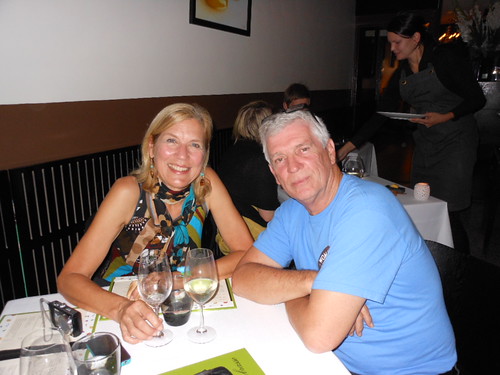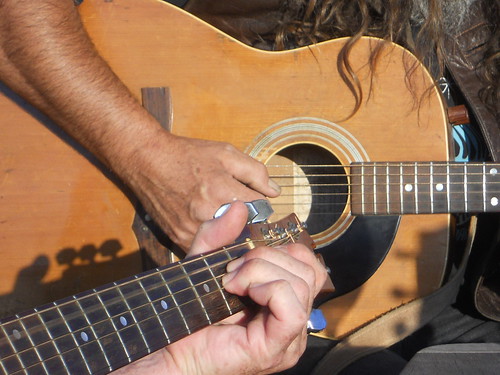An event called Designing Learning in the Digital Age took place here in Adelaide a week or so ago. After the initial keynote (which was generally very well received) there were a number of break-out sessions that, according to the majority of the feedback, failed badly.
SAMPLES of FEEDBACK FROM EVALUATION
- Will certainly not attend any future events where these presenters are involved.
- The event did not model or address the issue of 'facilitating disruptive and transformative learning experiences' as advertised.
- no leveraging of the knowledge in the room or attempt to understand where the audience was at or, understanding of the technological capacity in the room for participants
- the session on disruptive innovation delivered zero. No content, no strategies
- I was hoping for tangible ideas from other contexts. The flyer made it sound as though it was for people currently working in this space ... The focus on social networking sites as a source of knowledge and content was, for mine, overdone and not reflective of the promotional material.
- little new knowledge or ways of representing it were offered.
Will certainly not attend any future events where these presenters are involved.
I was one of the presenters involved. In 30 plus years of working as an educator in schools, adult education, professional development, and as an invited or keynote speaker at conferences feedback on my efforts has been largely positive, so to get such a bad wrap for the first time in my professional life hurts. And so I must look at why it happened.
In 2006 I had the great privilege of participating in the inaugural Future of Learning in a Networked World Unconference in NZ. This was the first time I experienced first hand how a group of connected educators could generate vast amounts of significant content in a relatively short time. And I had hoped that participants in this recent event would be able to replicate something like that NZ experience.
Promotional materials for the day said things like:
- Intending participants are those who "want to see change in the way education is delivered, and who see the value of networked learning"
- participants will be actively curating their own learning
- It is expected that participants will already have skills in the use of educational and mobile technologies, and social media
- you'll ... ideally be used to creating and sharing content and/or media on the open web.
- handy...would be an account on one or two (or more) social media sites eg: blog, podcast, wiki, Twitter, Flickr, YouTube, LinkedIn or even Facebook
- develop that resource you would like to show your key decision-makers
- locate, generate and tag content to create usable resources
Extracting some key words from the above list we get:
- networked learning
- actively curating
- skills in ...social media
- used to creating and sharing content and/or media on the open web
- develop
- locate, generate, tag
I think it’s clear from the above description that participants would be doing things. The intent was that those who attended this event would come ready to share, learn, collaborate, create and curate content. That is, it would not be an event where facilitators would be instructing, but rather an event where emphasis was squarely on the participants, and the knowledge and expertise they brought to the event would make or break the day.
But that it is not what happened. It is clear from the feedback that some came expecting to be taught and talked at. I had no intention of putting myself in that role for such an event. It would be ludicrous to even try. All my co-facilitator and I wanted to do was provide a time and place for connected educators to extend their personal learning networks, and tap into the collective intelligence of those who attended. To practice what is sometimes touted as a methodology for the digital age - paragogy. The notion of ‘paragogy’ relates to the peer production of learning
I wanted to provide a platform for participants to talk and learn from each other. I assumed that people would quickly self-organise into groups of mutual interest, decide what they were going to do, and do it. We would collect the resulting resources at the end of the sessions. It was also hoped that participants would be happy to complete tasks in the days after the event and share everything via a public Google Doc created for the event.
I have been part of such events before and that is what happened. It did not happen at this event. Why not?
1. the promotional materials and session descriptions obviously did not make what we trying to do explicit enough.
As I think back to previous events where this approach has been successful I realise that the term unconference had been used to describe the methodology employed. My mistake here was not to describe at least the events I was hosting as akin to unconference sessions. People came to learn from me as the facilitator; I was there to host a situation where people could learn from each other. Cross purposes.
2. people needed more time to get to know each other and explore what areas of mutual interest they might work on. I badly misjudged this, and more time should have been allocated to allow this to happen.
3. the technology at the venue failed. While this was really disappointing, many had access to their own network connection anyway. Several participants also had fairly basic levels of ICT literacy and were unable to use their devices to quickly produce content.
While I don't think the failure of the venue's technology was the crucial factor in determining the ultimate success or otherwise of the day, it certainly didn't help, and I imagine this would have got several people offside. For the record I feel cheated by the venue. In the lead-up discussions with Rydges Southpark I was very specific about the nature of the event and said that 60 people would be making intensive use of their in-house wireless and they assured me several times that their Internet could cope with such use. They were wrong, and they should never have accepted our booking for this event. And I should not have believed them. A hard lesson learned.
4. There was not enough space for people to work comfortably in groups. I had envisaged people working alone, in pairs or groups as desired. We have to accept responsibility for this - we misjudged the amount of space needed for people to interact in the way we hoped they would.
So - really quite ironic. We wanted to host an event where people could talk, share, create, and learn from each other to model how designing learning in the digital age needs to take these approaches into account, and we got feedback based on an expectation that we would be running teacher-led sessions that we had no intention of running.
We tried something new. We took a risk. We were trying to place “the abundance of content and connections ...at the centre of a model of teaching.” We failed. Innovation theory is quite clear that taking risks and failing is a necessary prerequsite for eventual success so I guess on that score we can salvage some hard learned lessons from the event, but ultimately we failed, and I have to accept responsibility for that. I'm really sorry that so many were disappointed. And you're only as good as your last gig...
.jpg)
























